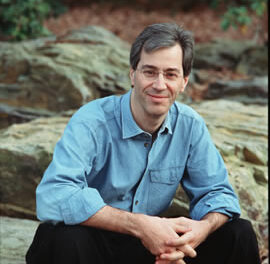A Christmas Story is an utter delight, its fiendishly skewed child’s-eye-view of the holidays a welcome antidote to the overwhelming load of treacle assaulting the collective digestion at this season. If you aren’t lucky enough to own a copy yourself, you can most likely rent one. Alternately, you could settle into a comfortable chair with a copy of Jean Shepherd’s In God We Trust: All Others Pay Cash and revel in the unerring humaneness of the late humorist’s often wildly funny voice. Either option would be almost infinitely preferable to sitting through the new stage adaptation of A Christmas Story the North Carolina Theatre, Hot Summer Nights at the Kennedy, and Broadway Series South have offered up at the A.J. Fletcher Opera Theatre.
A “sleeper” hit with audiences (if not critics) when it was released in 1983, Bob Clark’s movie has since become a deserving perennial. Few could have predicted that the man who wrote and directed the infantile Porky’s would catch Shepherd’s disarming style so accurately, or with so much good spirit. Not so, alas, Philip Grecian’s theatrical version. While most of the expected set pieces are here — The Old Man’s prized leg-lamp, Flick getting his tongue stuck on the flagpole, Ralphie’s ill-fated visit with Santa Claus — the thing as a whole simply doesn’t work as theatre.
Far too much of what now floods our popular stage are movie adaptations. In a parlous economic context, one can easily understand the reasons why: pre-sold titles stand a better shot (or so it is believed) at the brass ring. And many have done quite well. But what is ignored in nearly every case is that while technological advances make it possible to ape motion picture practices, the result is usually, and dispiritingly, contrived and woefully earth-bound. I excuse The Producers and Hairspray because the creators of these shows (only one of which was based on a successful movie, it should be noted) re-configured the original material as theatre. In the Shepherd/Clark movie, young Ralphie’s riotous daydreams were conceived in cinematic terms through close-ups, cutting, and point-of-view, as fantasy, and they soared. In this edition, they feel, with rare exceptions, far too literal, and most of them land with an almost palpable thud. Only the “Oh, fudge!” moment, accomplished via strobe light and performed in slow motion, really succeeds.
The play has been designed with remarkable handsomeness — Chris Bernier’s splendid, brick-and-salmon-pastel, two-tired, cutaway interior house set is exactly right and looks almost sturdy enough to plunk down in Hohman, Indiana — and is performed by a cast of bright comedians of varying ages who struggle gamely, if futilely, to supplant our memories of Darren McGavin, Melinda Dillon, and Peter Billingsley. The single, rather glaring exception is T. Philip Caudle who, as a grown-up Ralph provides the distinctive Jean Shepherd narration and is both over-fond of chuckling and under-prepared with his lines.
What makes both Jean Shepherd’s writing and the original A Christmas Story movie so special is that Shepherd did not simply channel childhood vividly. He caught the feel of it — the endless expectations, the fantastic reveries youthful imagination engenders, and the all-encompassing sense that one’s immediate experiences and desires are of absolute, life-or-death importance. He had the gift as well of seeing just how bittersweet yet hilariously funny the whole business could be. And he caught, in prose, the sound of one’s past.
Speaking of sound: it says something about an adaptation of Shepherd’s work when the recorded sound effects are a great deal funnier than what’s happening on the stage.
A Christmas Story plays through Friday, December 21, at the Fletcher Opera Theater, Raleigh. For details, see our calendar.












